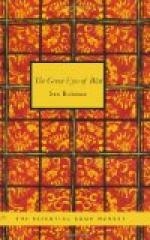I pressed on with greater assurance, until the house became visible. Now I perceived that I had indeed strayed from the carriage sweep in some way, for the path that I was following terminated at the foot of a short flight of moss-covered steps. I mounted the steps and found myself at the bottom of a terrace. The main entrance was far to my left and separated from the terrace by a neglected lawn. That portion of the place was Hanoverian and ugly, whilst the wing nearest to me was Tudor and picturesque. Excepting the yellow light shining out from a window on the right of the porch, no illuminations were visible about the house, although the brewing storm had already plunged the hollow into premature night.
My conception of Friar’s Park had been wide of the reality—and there was no sign of occupancy about this strange-looking mansion, which might have hidden forgotten for centuries in the horse-shoe of the hills. The stillness of the place was of that sort which almost seems to be palpable; that can be seen and felt. A humid chill arose apparently from the terrace, with its stone pavings outlined in moss, and crept up from the wilderness below and down from the fir woods above.
I had crossed the terrace and the lawn, and now stood looking through the open French window from which light had proceeded into a room that evidently adjoined the hall. A great still darkness had come, and on a littered table in this room a reading-lamp was burning.
The room was furnished as a library. Every available foot of wall space was occupied by laden bookcases. The volumes were nearly all old and many of them were in strange, evidently foreign, bindings. Items of chemical apparatus and cases of specimens were visible also as well as an amazing collection of Egyptian relics strewn about the place in the utmost disorder.
At the table a man was seated, deep in study of a huge leather-bound volume. He was strangely gaunt, and apparently very tall. His clean-shaven face resembled that of Anubis, the hawk-headed god of Ancient Egypt, and his hair, which was growing white, he wore long and brushed back from his bony brow. His skin was of a dull, even yellow color, and his long thin brown hands betrayed to me the fact that the man was a Eurasian. The crunching of a piece of gravel under foot revealed my presence. The man looked up swiftly.
I started. Those widely-opened black eyes were truly hawk-like in their dark intensity of gaze, and the uncanny resemblance to Anubis was heightened by them. More than ever convinced that I had made a mistake:
“Forgive me for so rudely disturbing you,” I said, “but I was under the impression that this was Friar’s Park, whereas I fear I have trespassed.”
The intense gaze never left my face for a moment, but:
“There is no trespass,” answered the man at the table, speaking in a high harsh voice and with a marked but evasive accent. “All visitors are welcome—chance ones, or otherwise. But you have certainly lost your way; this is the Bell House.”




